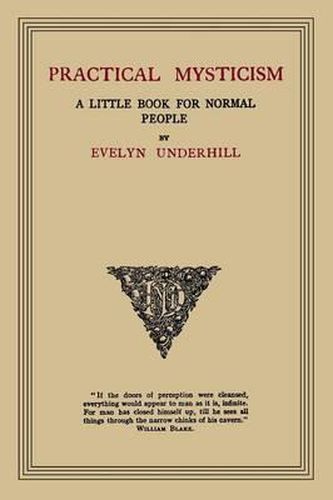Readings Newsletter
Become a Readings Member to make your shopping experience even easier.
Sign in or sign up for free!
You’re not far away from qualifying for FREE standard shipping within Australia
You’ve qualified for FREE standard shipping within Australia
The cart is loading…






Exact facsimile of the original edition, not reproduced with Optical Recognition Software. Practical Mysticism is a work by one of the foremost 20th century Christian mystics, Evelyn Underhill. Her book, Mysticism: A Study in the Nature and Development of Spiritual Consciousness, is the authoritative text of modern mysticism. This shorter work, Practical Mysticism, is an abridged version of Underhill’s theology, and is a perfect starting point for immersion into the subject. It is written, to some extent, with non-Christians in mind, so Underhill is at her simplest here, yet her language is still poetic and enjoyable to read. Topics are addressed broadly, and Chapter 1, What is Mysticism? is an enlightening place for those unfamiliar with the topic to begin. She invites the reader to become involved in mysticism, giving simple examples of how it is relevant to everyday people. Underhill was greatly influenced by mystics such as St. Teresa, St. Augustine, and Thomas a Kempis, and examples from these writers, as well as poets like Keats and Whitman, are sprinkled throughout the book. A fine place to start before diving into her more intense works, Practical Mysticism has captivated generations of readers, and is still the premier text for the introductory study of mysticism.
$9.00 standard shipping within Australia
FREE standard shipping within Australia for orders over $100.00
Express & International shipping calculated at checkout
Exact facsimile of the original edition, not reproduced with Optical Recognition Software. Practical Mysticism is a work by one of the foremost 20th century Christian mystics, Evelyn Underhill. Her book, Mysticism: A Study in the Nature and Development of Spiritual Consciousness, is the authoritative text of modern mysticism. This shorter work, Practical Mysticism, is an abridged version of Underhill’s theology, and is a perfect starting point for immersion into the subject. It is written, to some extent, with non-Christians in mind, so Underhill is at her simplest here, yet her language is still poetic and enjoyable to read. Topics are addressed broadly, and Chapter 1, What is Mysticism? is an enlightening place for those unfamiliar with the topic to begin. She invites the reader to become involved in mysticism, giving simple examples of how it is relevant to everyday people. Underhill was greatly influenced by mystics such as St. Teresa, St. Augustine, and Thomas a Kempis, and examples from these writers, as well as poets like Keats and Whitman, are sprinkled throughout the book. A fine place to start before diving into her more intense works, Practical Mysticism has captivated generations of readers, and is still the premier text for the introductory study of mysticism.